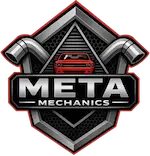At Meta Mechanics, we specialize in high-performance vehicles, and we’re committed to providing top-tier service to ensure your car’s safety and efficiency. Recently, we completed a Brake Oil Change on a 2022 Audi e-Tron, and during the inspection, we uncovered several critical issues that needed immediate attention. As an electric vehicle, the Audi e-Tron has unique braking system requirements, so it’s essential that every part of the system is in optimal condition.
Here’s a detailed breakdown of the issues we found during the brake oil change and the solutions we provided:
Issue Identified:
1. Low Brake Fluid Level
Issue:
Upon inspecting the brake system, we noticed that the brake fluid levels were below the recommended range. Low fluid levels can compromise the regenerative braking system’s efficiency and lead to reduced braking power. In an electric vehicle like the Audi e-Tron, the braking system is highly integrated with the regenerative braking, making it even more crucial to maintain proper fluid levels for smooth, effective braking.
Solution:
We topped up the brake fluid with high-quality, Audi-approved fluid to restore the level to the manufacturer’s specifications. This ensures optimal braking performance and maintains the balance between the hydraulic and regenerative braking systems in the e-Tron.
2. Contaminated Brake Fluid
Issue:
Brake fluid is highly susceptible to contamination, and we found that the fluid had absorbed moisture over time. Contaminated fluid can lower the boiling point, which increases the risk of brake fade and reduces braking effectiveness, especially during high-speed driving or frequent braking events. In electric vehicles, moisture-contaminated brake fluid can also accelerate corrosion in the brake system.
Solution:
We performed a complete brake fluid flush, removing the old fluid and replacing it with fresh, clean brake fluid. This not only restores the brake system’s efficiency but also helps prevent corrosion of the internal components, ensuring that your e-Tron’s braking system lasts longer and operates safely.
3. Air Trapped in Brake Lines
Issue:
During the brake fluid change, we found that air had become trapped in the brake lines. Air in the system can cause a “spongy” brake pedal feel, resulting in less responsive braking and a longer stopping distance. For an electric vehicle like the e-Tron, where precision is key for both safety and driving performance, this is a significant issue.
Solution:
We performed a brake bleeding procedure to remove all air from the brake lines. This ensures that the hydraulic braking system is fully pressurized, eliminating the spongy pedal feel and restoring the vehicle’s braking performance to its optimal state.
4. Worn Brake Pads
Issue:
Though the e-Tron uses regenerative braking as its primary method of slowing down, traditional hydraulic brakes are still essential for situations that demand full stopping power. During our inspection, we discovered that the rear brake pads were nearing the end of their lifespan. Worn brake pads can cause uneven braking and increase wear on the brake rotors.
Solution:
We recommended replacing the rear brake pads to ensure smooth and consistent braking performance. Replacing worn pads not only improves safety but also prevents further damage to the brake rotors, saving the owner from costly repairs down the road.
5. Brake System Warning Light
Issue:
While inspecting the vehicle, we noticed that the brake system warning light was illuminated on the dashboard. This could indicate a range of issues, from low fluid levels to more complex faults with the braking system’s sensors or ABS components.
Solution:
After addressing the low fluid and brake fluid contamination, we cleared the warning light and performed a comprehensive diagnostic scan to ensure there were no underlying issues with the Audi e-Tron’s advanced braking systems, including the ABS and electronic parking brake. After the scan, the warning light remained off, confirming that the issue was resolved.
Audi E-tron Inspection of Brake Fluid Level and Condition
Audi E-tron Check for Fluid Contamination (water, dirt, air bubbles)
Audi E-tron Removal of Old Brake Fluid
Audi E-tron Flushing of the Brake Fluid System (if necessary)
Audi E-tron Refill with New, Manufacturer-Specified Brake Fluid
Audi E-tron Bleeding the Brake Lines to Remove Air
Audi E-tron Inspection of Brake System for Leaks
Audi E-tron Test of Brake Pedal Feel and Response
Audi E-tron Check and Top-Up of Fluid Reservoir
Audi E-tron Final Brake Performance Test


